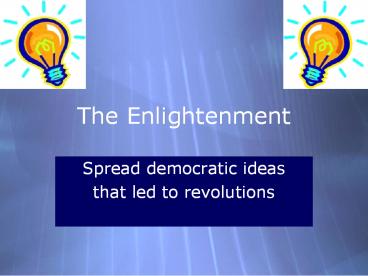The Enlightenment - PowerPoint PPT Presentation
1 / 10
Title:
The Enlightenment
Description:
The Enlightenment Spread democratic ideas that led to revolutions The Enlightenment During the 1600s and 1700s, belief in the power of reason grew. – PowerPoint PPT presentation
Number of Views:140
Avg rating:3.0/5.0
Title: The Enlightenment
1
The Enlightenment
- Spread democratic ideas
- that led to revolutions
2
The Enlightenment
Overview
During the 1600s and 1700s, belief in the power
of reason grew. Writers of the time sought to
reform government and bring about a more just
society.
Despite opposition from government and Church
leaders, Enlightenment ideas spread, and helped
to form the concepts of democracy and nationhood.
3
The Enlightenment
Enlightenment The period in the 1700s in which
people rejected traditional ideas and supported a
belief in human reason.
Natural Laws According to some philosophers,
rules that govern human nature.
- Thinkers
- Thomas Hobbes
- John Locke
- Montesquieu
- Voltaire
- Jean-Jacques Rousseau
4
John Locke
- All people are born with NATURAL RIGHTS
- Life
- Liberty
- Property
- The government is supposed to protect those
rights - If it doesnt, the people should OVERTHROW it.
5
Baron de Montesquieu
- Power separated into 3 branches
- SEPARATION OF POWERS to stop rulers from getting
absolute power
6
Also said
- Need a system of checks and balances to ensure
that 1 branch can not dominate the other 2!
7
Jean Jacques Rousseau
- People are born free.
- But if everyone is free, there is chaos.
- So we agree to join together so that we can keep
each other safe. - We agree to a SOCIAL CONTRACT
- We give the government the power to make us
follow laws - and those laws keep us all safe AND protect our
rights.
8
Voltaire
- Believed in FREE SPEECH
- I disapprove of what you say, but I will defend
to the death your right to say it.
9
Declaration of Independence
10
That whenever any form of government becomes
destructive of these ends, it is the right of the
people to alter or to abolish it
We hold these truths to be self-evident That
all men are created equal that they are endowed
by their Creator with certain unalienable rights
That, to secure these rights, governments are
instituted among men, deriving their just powers
from the consent of the governed































